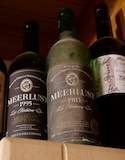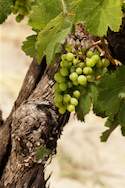By 1996 the Cape Winemakers Guild membership figure stood at just 16, remaining constant and relatively small as new winemakers were invited to join mainly when others resigned or moved on for various reasons.

Soul Searching
There was a sense that the Guild needed to expand its functions, move with the times: the world had opened up, bringing sea changes to the local winemaking and trading environment.
The industry and the growing wine media (as information disseminator to an increasingly educated wine public) were beginning to look to the Guild for guidance, leadership and commentary as a unified body or industry association.
With growth came the inevitable need for more formal management structures to run Guild affairs, which could no longer be shouldered by the members themselves on a voluntary, ad-hoc basis. Members' commitment to the Guild and its activities would need to be formalised, ensuring that whatever effort and cost were invested would not be wasted.
Understandably, members were loath to lose the Guild's original feel - a loose affiliation of like-minded craftsmen who knew one another well - and function - a small 'study group' as a source of shared expertise and learning in a desire to constantly improve.
'The Guild is not only about gaining factual information about our field of endeavour, but it's also about the professionalism of conduct in doing business. But it's also about friendship.'
Says Carl Schultz, chairman of the Guild during a period which demanded serious soul searching, compromise, and firm action among the members and their elected committee: ·we wanted to protect and enhance the Guild as something of value, to elevate the professionalism of the Guild and to increase membership, with winemaking excellence as the main requirement.'
In 1999, the Guild's first formal strategic planning session was held at Gonnemanskraal at founding member Jan 'Boland' Coetzee's West Coast cottage, to map the way forward for the Guild.
The Guild became a member of the South African Wine & Spirit Exporters Association (SAWSEA), now Wines of South Africa (WOSA), the independent, non-profit company representing all South African wine exporters dedicated to building 'brand South Africa' internationally.
A special general meeting was held to appoint auditors and a public relations company was engaged to handle media and marketing liaison. The role of Hofmeyr Mills as the Guild's auctioneer was made official.
The Auction Middle Years

From 1993 to 1995 the auction had been held at the hotel on the historic Cape Dutch wine farm Lanzerac in Stellenbosch. A marquee on the lawns lent the proceedings a convivial, farmers' market atmosphere.
The Michael James Organisation officiated here as well as at the next two auctions held at another historic wine property, Spier. From 1998 professional auctioneer Henré Hablutzel of Hofmeyr Mills has been in charge. Apart from two years at the Lord Charles Hotel in Somerset West followed by a year at the Cape Town International Convention Centre, the sale has remained at Spier.
These changes in the auction set-up reflected the more serious, businesslike mien of the members as the event became the increasingly public face of the Guild.
The development of the auction also illustrated the Guild's ongoing commitment to excellence: staying abreast of modern, more sophisticated conditions of sale required by greater volumes of wine and numbers of bidders, and offering efficient service.
Buyers by now included many from overseas. Tastings of the annual auction wines (including the local CWG Showcases) were being held for top media, as well as potential buyers (including members of the public) in the UK, Hong Kong, Belgium, The Netherlands, and Denmark in the month preceding the auction.
The Guild was assisted in its business ventures during this period by Johann Krige, canny co-owner of Kanonkop, who had been asked to fulfill the function of auction manager and general business advisor to the Guild.
The need for sponsorship had also been recognised: with growth came a degree of financial investment that could no longer be expected to be met by the individual members.
However, it was made clear that sponsorship would not be allowed to compromise the integrity and 'independence' of the Guild. This understanding was fully embraced by the institution that eventually came on board: Nedbank. Having supported the auction in 1990 and 1991, it has been committed to the Guild and its activities since 1996.
For the Greater Good

In 1999, the Guild, in association with Nedbank, established the Nedbank Cape Winemakers Development Trust. It was to fulfill the need felt by Guild members to contribute at a grassroots level to the people of the Winelands through education and social upliftment of disadvantaged groups, in order to create a thriving, inclusive wine industry with a sustainable future.
Funded by donations and proceeds from Guild events such as the annual silent and charity auctions, children have been given the opportunity to attend Paarl agricultural school Hoer Landbouskool Boland and Stellenbosch girls' high school Bloemhof.
Funding of other Winelands educational and social support institutions include the Pebbles project for children with special needs, including those affected by alcohol-related diseases such as fetal alcohol syndrome.
The first trustees, under the chairmanship of BOE's David Knott, included Guild members Jan 'Boland' Coetzee and Philip Costandius; then-Guild auction manager and business advisor Johann Krige of Kanonkop; James Browne of Hartenberg; and Samuel van der Merwe of Kanonkop, later replaced by Johannes Demas of Simonsig, who served from 2004 to 2012, who negotiated the Guild's challenging middle decade.
'We agreed that as guild members it's not just about what we gain through participation in the Guild, but what we can contribute for the betterment of our craft, Cape wine, and our Winelands community.'
Towards the end of the Guild's second decade, the constitution was amended and expanded. A code of conduct and a set of disciplinary procedures were incorporated. It was agreed that a concerted effort is made to increase membership, without compromising on a certain standard of excellence in winemaking by the nominee.
In 2000, a simple but meaningful change was made to the name of the Guild: the word 'independent' was dropped in recognition of the more autonomous, business- rather than politically-driven nature of the industry.
It made way for the newly named Cape Winemakers Guild to invite talented winemakers to join, irrespective of the nature of their employ, be it working on their own property, as negotiate vintners owning neither vineyard nor winery, or as cellarmasters for a co-operative or corporate wine producer.
The new millennium saw a fresh, new public face for the Guild: an ornate medieval key became its symbol, and the auction wine label was refreshed; a website - www.capewinemakersguild.com - was set up; and an annual newsletter introduced.
Having been employed by the Guild since 1999, Kate Jonker was officially appointed as Guild general manager in 2001, handling all administrative, events, marketing, and financial functions for the Guild, including the annual auction.
For the Record
Others inducted during the Guild's second decade who subsequently resigned include: Sakkie Kotze, Anton Bredell, Nico van der Merwe, Martin Meinert, Andre van Rensburg, Abrie Bruwer, Louise Hofmeyr (Billy Hofmeyr's daughter), and Christopher Keet.
The 12 winemakers who joined the Guild in its second decade and celebrated its 30th anniversary are Carl Schultz and Jeremy Walker (1996); David Finlayson, Kevin Grant and Nicky Versfeld (1999); Charles Hopkins, Danie Steytler, and David Trafford (2000); Gary Jordan (2001); and Bruce Jack, Marc Kent and Teddy Hall (2002).
Of these cellarmasters, Danie Steytler stepped down as producing member at the end of 2017 (the wines on family farm Kaapzicht having become the full responsibility of longstanding winemaker son Danie Jnr) but continued contributing expertise and experience to the Guild as a non-producing member.
Nicky Versfeld, Teddy Hall, and Bruce Jack resigned at the end of 2018, the former two continuing to consult and make wine as Nicky Versfeld Wines and Teddy Hall Wines respectively. Bruce is focussing on developing his The Drift Estate vineyards in the Overberg, establishing Bruce Jack as a global wine brand, and expanding international collaboration on wines (Spain’s La Bascula) and local and international craft ciders (Cluver&Jack; Orpens).